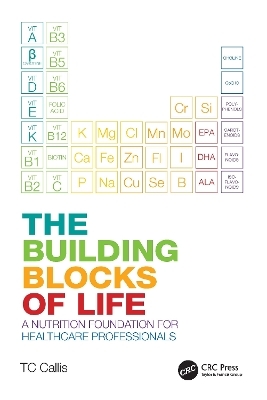
The Building Blocks of Life
CRC Press (Verlag)
978-1-032-27111-8 (ISBN)
Within the United Kingdom (UK), most mainstream healthcare practitioners receive little or no nutrition education during their years of training. As a consequence, the understanding of nutrition amongst primary care practitioners such as general practitioners, pharmacists, midwives, and practice nurses is limited and is largely focused on energy consumption and obesity. There is little knowledge of the wealth of micronutrients that underpin health, nor of the ticking timebomb of insufficient intakes of those micronutrients amongst a significant proportion of the population in the UK.
The Building Blocks of Life: A Nutrition Foundation for Healthcare Professionals is a step towards redressing that balance. It sets out an informative and engaging narrative on how and why nutrition is the basis for good health. It discusses UK-specific issues with regards to diet and intakes of vitamins, minerals, essential fatty acids and other micronutrients. It also raises concerns about the potential negative health implications of the generally poor UK diet and suggests ways that healthcare practitioners can support patients in improving their long-term health outlook.
Nutrition policy in the UK needs to be dragged into the 21st century and this book sets out evidence-based arguments which challenge current public health myths such as the idea that 10 micrograms of vitamin D is all anyone needs or the messaging around the consumption of saturated fat vs highly processed seed oils or that everyone can get all the nutrients they need from a varied and balanced diet.
Although The Building Blocks of Life: A Nutrition Foundation for Healthcare Professionals focuses on concerns around poor diet and the consequent micronutrient inadequacies in the UK, the nutritional detail is relevant no matter where you are in the world. Everyone eats, all the time. It is time that mainstream medicine looked towards food as both a cause and a solution to many of the chronic degenerative conditions that plague modern life.
For nearly two decades TC worked backstage in London’s West End theatres and in the film and TV industry. But in 1999, looking for a new challenge she embarked on a Batchelor of Science degree course for Nutritional Therapy at the University of Westminster. Three years of rigorous scientific study firmly cemented her passion for nutrition and her belief in a thorough and questioning approach to evidence. Graduating with a 2:1 BSc Hons in 2002 TC went on to work for the UK Food Standards Agency, the government department charged with ensuring food safety and standards across the United Kingdom of Great Britain and Northern Ireland. In eight years working for government, TC came to realise the vital importance of an evidence based regulatory framework to ensure food safety. However, she also noted with some concern that UK government nutrition policy was not always as robustly up to date as it could be. Realising that lobbying for change to national nutrition policy would be easier outside of government, TC moved into industry. From 2010-2020 she worked for the Proprietary Association of Great Britain (PAGB), a trade association representing the manufacturers of over-the-counter medicines, consumer-facing medical devices and food supplements. During her time there, TC raised the profile of vitamin D at national level; initiated and drove a collaborative project where the wider food supplements industry and government worked together to gain a health claim on folic acid reducing the risk of neural tube defects; commissioned multiple peer review papers and academic reports on the state of nutrition in the UK; wrote Nutrition Fact Sheets for the independent charity the Self Care Forum; successfully lobbied government at EU and national level to allow the use of the word “antioxidant” in the advertising and marketing of foods; and co-ordinated nine trade associations with varying agendas in responding to UK government consultations on the use of single-use plastics and recycling. At the beginning of 2020 TC left industry to start working on a book. With this book TC hopes to redress some of the imbalances in nutrition awareness that UK government policy has imposed, as well as increase understanding of nutrition amongst primary care practitioners.
Introduction
Chapter 1. Nutrition Basics
Chapter 2. Malnutrition
Chapter 3. Digestion
Chapter 4. Obesity
Chapter 5. Immunity
Chapter 6. Vitamin D
Chapter 7. Conception, pregnancy, and foetal development
Chapter 8. Tired all the time
Chapter 9. Different Ways of eating
Conclusion
| Erscheinungsdatum | 10.03.2023 |
|---|---|
| Zusatzinfo | 9 Tables, black and white; 4 Line drawings, black and white; 3 Halftones, color; 13 Halftones, black and white; 3 Illustrations, color; 17 Illustrations, black and white |
| Verlagsort | London |
| Sprache | englisch |
| Maße | 156 x 234 mm |
| Gewicht | 1020 g |
| Themenwelt | Medizin / Pharmazie ► Gesundheitsfachberufe ► Diätassistenz / Ernährungsberatung |
| Naturwissenschaften ► Biologie | |
| Technik ► Lebensmitteltechnologie | |
| ISBN-10 | 1-032-27111-6 / 1032271116 |
| ISBN-13 | 978-1-032-27111-8 / 9781032271118 |
| Zustand | Neuware |
| Informationen gemäß Produktsicherheitsverordnung (GPSR) | |
| Haben Sie eine Frage zum Produkt? |
aus dem Bereich


